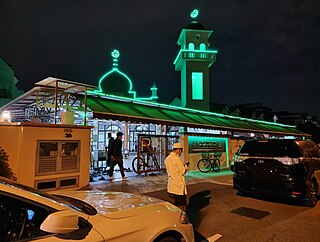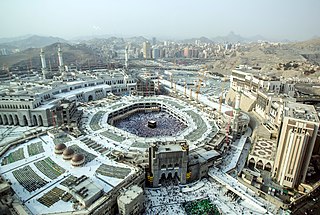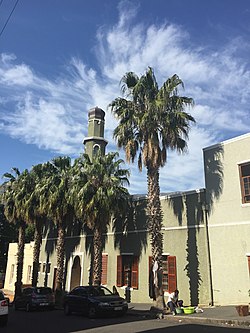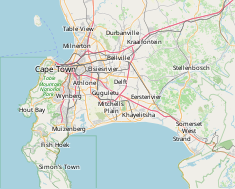
Imam is an Islamic leadership position. For Sunni Muslims, Imam is most commonly used as the title of a worship leader of a mosque. In this context, imams may lead Islamic worship services, lead prayers, serve as community leaders, and provide religious guidance. Thus for Sunnis, anyone can study the basic Islamic sciences and become an Imam.
A mosque or masjid is a place of prayer for Muslims. Mosques are usually covered buildings, but can be any place where prayers (sujud) are performed, including outdoor courtyards.

Cape Malays also known as Cape Muslims or Malays, are a Muslim community or ethnic group in South Africa. They are the descendants of enslaved and free Muslims from different parts of the world who lived at the Cape during Dutch and British rule.

In Islam, Friday prayer or Congregational prayer is a prayer (ṣalāt) that Muslims hold every Friday, after noon instead of the Zuhr prayer. Muslims ordinarily pray five times each day according to the sun's sky path regardless of time zones. Jumu’ah means Friday in the Arabic language. In many Muslim countries, the weekend is inclusive of Fridays, while in others, Fridays are half-days for schools and some workplaces. It is one of the most exalted Islamic rituals and one of its confirmed obligatory acts.

Islam in South Africa is a minority religion, practised by roughly 1.6% of the total population. Islam in South Africa has grown in three phases. The first phase brought the earliest Muslims as part of the involuntary migration of slaves, artisans, political prisoners, and political exiles from the Dutch East Indies (Indonesia) that lasted from about 1652 to the mid-1800s. The second phase was the arrival of indentured labourers from British India to work in the sugar-cane fields in Natal between 1860 and 1868, and again from 1874 to 1911. Of the approximately 176,000 Indians of all faiths who were transported to the Natal province, almost 7–10% of the first shipment were Muslims.
Amina Wadud is an American Muslim theologian. Wadud serves as Visiting Professor at Indonesian Consortium for Religious Studies and was also a visiting scholar at Starr King School for the Ministry. Wadud has written extensively on the role of women in Islam.
There is a difference of opinion among Muslims regarding the circumstances in which women may act as imams, i.e. to lead a mixed gendered congregation in salat (prayer). The orthodox position is that women cannot lead prayers for men, which is justified by the different roles that men and women take in society. A small number of schools of Islamic thought make exceptions for tarawih or for a congregation consisting only of close relatives. Women acting as leaders, teachers, and authorities in other capacities however is not deviating from the Islamic orthodoxy as women have never been restricted from becoming scholars, ulema, jurists, muftis, preachers, missionaries, or spiritual guides. There is a long history of female masters of Islamic sciences teaching men.

Cuba is a majority Christian nation, with Islam being one of the smallest minority faiths in the country. According to a 2011 Pew Research Center report, there were then 10,000 Muslims in Cuba who constitute less than 0.1% of the population. As of 2012, most of the 10,000 Cuban Muslims were converts to the religion.

The Bo-Kaap is an area of Cape Town, South Africa formerly known as the Malay Quarter. It is a former racially segregated area, situated on the slopes of Signal Hill above the city centre and is a historical centre of Cape Malay culture in Cape Town. The Nurul Islam Mosque, established in 1844, is located in the area.

Sheikh Abu Bakr Effendi, also spelt Ebu Bekir Efendi, was an Ottoman qadi sent in 1862 by Sultan Abdulaziz at the request of Queen Victoria to the Cape of Good Hope, in order to teach and assist the Muslim community of the Cape Malays. He is known for having made several major contributions to Islam in South Africa, including the translation of his 1877 work, Bayân al-Dîn, into the Afrikaans language, then in a very early stage of development. He is credited with introducing the fez as headwear for male Muslims in the Cape, and his presence had a significant impact on the expansion and consolidation of Islam at the Dutch Cape Colony.

The holiest sites in Islam are predominantly located in the Arabian Peninsula and the Levant. While the significance of most places typically varies depending on the Islamic sect, there is a consensus across all mainstream branches of the religion that affirms three cities as having the highest degree of holiness, in descending order: Mecca, Medina, and Jerusalem. Mecca's Al-Masjid al-Haram, Al-Masjid an-Nabawi in Medina, and Al-Masjid al-Aqsa, or the Temple Mount, in Jerusalem are all revered by Muslims as sites of great importance.

Masjid Al-Abdul Razak is a mosque in Singapore, located at Jalan Ismail, off Jalan Eunos. The mosque is accessible from Eunos MRT station.

The Nurul Islam Mosque is a mosque in the Bo-Kaap area of Cape Town, South Africa. When it was founded in 1844, the structure could hold 150 worshipers. Renovated in 2001, it can now hold 700 worshipers.

Palm Tree Mosque, or the Church of Jan van Bougies, or the Dadelboom Mosque, is a former residence and current mosque in Long Street, Cape Town, South Africa. It is the oldest substantially unaltered building in Long Street.

Masjid al-Haram, also known as the Grand Mosque or the Great Mosque of Mecca, is a mosque enclosing the vicinity of the Kaaba in Mecca, in the Mecca Province of Saudi Arabia. It is a site of pilgrimage in the Hajj, which every Muslim must do at least once in their lives if able, and is also the main phase for the ʿUmrah, the lesser pilgrimage that can be undertaken any time of the year. The rites of both pilgrimages include circumambulating the Kaaba within the mosque. The Great Mosque includes other important significant sites, including the Black Stone, the Zamzam Well, Maqam Ibrahim, and the hills of Safa and Marwa.

The Tana Baru Cemetery is a Muslim cemetery where some of the earliest and respected Muslim settlers of South Africa were buried. The cemetery is located in Bo-kaap, Cape Town.

Salat al-jama‘ah or prayer in congregation (jama'ah) is considered to have more social and spiritual benefit than praying by oneself. When praying in congregation, the people stand in straight parallel rows behind the chosen imam, facing qibla. The imam, who leads the congregation in salat, is usually chosen to be a scholar or the one who has the best knowledge of the Qur'an, preferably someone who has memorised it in its entirety. In the first row behind the Imam, if available, would be another hafiz to correct the Imam in case a mistake is made during the performance of the salat. The prayer is performed as normal, with the congregation following the actions and movements of the imam as he performs the salat.

Faldela Williams was a South African cook and cookbook writer whose books inspired generations of cooks after her to preserve the culinary heritage of South Africa's Cape Malay people.

The Jamia mosque or Queen Victoria mosque is situated at the corner of Chiappini and Castle street, Cape Town. It is considered to be the first and oldest mosque in Cape Town, and the largest in the Bo-Kaap area of Cape Town.

Al-Hilal Mosque or Al Hilal Old Mosque of Katangka, better known as Katangka Mosque, is a historical mosque in South Sulawesi, Indonesia. Constructed in 1603 by the first Muslim ruler of the Sultanate of Gowa, Sultan Alauddin, the mosque is considered the oldest mosque in South Sulawesi.

















